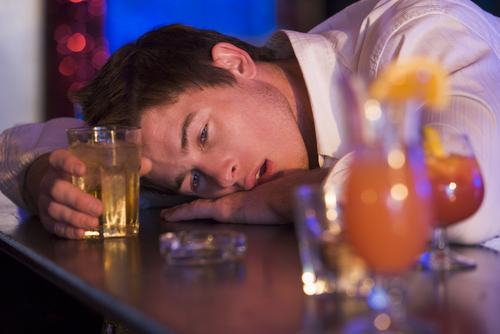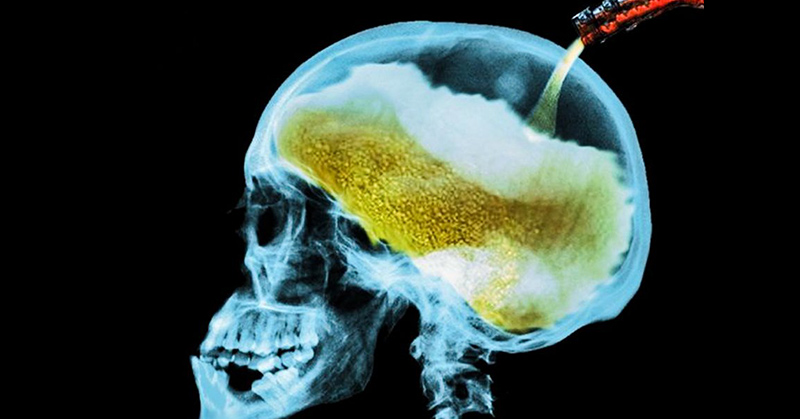Alcohol is a large part of our society. We drink it when we go out to brunch, lunch, and dinner, when we have guests over, we go out for drinks to catch up with old friends or for a first date, and cheers each other enthusiastically to celebrate birthdays, weddings, graduations, and the like.
Whether you’re having one or two casual drinks or you’ve tallied up enough drinks to have you dancing and singing on top of the bar, it can’t be denied that even just a small amount of alcohol affects our brains and our behaviors.
The Science of the Effect of Alcohol on the Brain
Alcohol is classified as a depressant, as opposed to a stimulant like the caffeine in coffee and tea. Despite this classification, when people drink, they tend to have a spark of energy, and feel excitement, elation, and that well-known alcohol “buzz”. Why is it that something that technically is supposed to make you sleepy instead make you able to drop it like it’s hot on the dance floor? (1)
Alcohol is considered a depressant because it targets the chemical GABA, which is the primary neurotransmitter in your brain. When this is affected, it alters our mood, behavior, arousal, and neuropsychological functioning. (1)
How Alcohol acts as a Stimulant

Everyone’s favorite form of “liquid courage” is more than just a depressant, however. When you are drinking, as your blood alcohol content rises, it acts as more of a stimulant. Several changes happen in your brain as you drink:
- Levels of Norepinephrine increase (the chemical responsible for excitement and impulsive behavior) (1)
- Activity decreases in the prefrontal cortex of your brain, the region responsible for rational thought, decision making, and violence (1)
- Activity decreases in the temporal cortex, the region that houses the hippocampus. The hippocampus is responsible for forming new memories, so a decrease in activity here explains “blackouts” and the inability to recollect events from your night out. (1)
- Activity decreases in the cerebellum, the region responsible for motor control. (1)
All of this explains why people tend to be “braver” while drinking, agree to things they normally wouldn’t (“of course I’ll sing that Adele song for karaoke!”), are more likely to hurt themselves (“no seriously guys, I can break dance. Just watch!”), and forget portions or even entire evenings out on the town. (1)
How Alcohol acts as a Depressant

When you stop drinking your blood alcohol content begins to fall and has a sedative effect on your brain. This is why people tend to get sleepy after a glass or two of wine or “pass out” quickly at the end of a night of drinking. (1)
The Spiritual Effect of Alcohol
Some studies suggest that alcohol affects those who are spiritual themselves differently than others. Researchers at the University of Kentucky found that the more religious someone is, the more likely they are to become aggressive when drinking. (3) In contrast, a study from the Journal of Studies on Alcohol found that spirituality, prayer, and meditation was of great benefit for those recovering from alcoholism. (4)
Psychology Today wrote an article about the spirituality of children, and how over time we tend to lose that spirituality as we grow and become adults. One of the contributing factors of this are drugs and alcohol, and the peer pressure to join in and use these substances.
Drinking is often used to fill the spiritual void that develops over time and causes adults to focus on “costly, destructive, short-term goals” rather than the more long-term journey of finding happiness and purpose within themselves. (5)
The Bottom Line
Regardless of whether you approach drunkenness from a scientific or a spiritual background, one thing we can all agree on is that drinking, especially when you have one or two more than perhaps you should, changes how you think, act, and effects your ability to refrain from texting your ex-boyfriend or walk down a set of stairs without falling over.
Like it or not, social drinking is a large part of our society. Please always remember to drink within your limits, never drink and drive, and for heaven’s sake don’t post anything on social media until you are back to your sober, rational self!
Sources
- (1) Gowin, J. (2010, June 18). Your Brain on Alcohol. Retrieved August 09, 2017, from https://www.psychologytoday.com/blog/you-illuminated/201006/your-brain-alcohol
- (3) Psychology. (n.d.). Retrieved August 09, 2017, from https://psychology.as.uky.edu/can-alcohol-release-beast-within-spiritual-people
- (4) Carroll, S. (1993, May). Spirituality and purpose in life in alcoholism recovery. Retrieved August 09, 2017, from https://www.ncbi.nlm.nih.gov/pubmed/8487537

